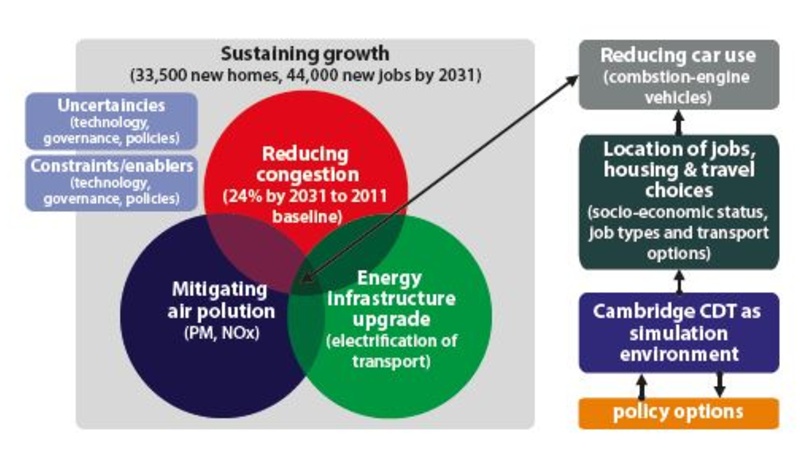Digital Cities for Change: testing a Cambridge city-scale digital twin for cross-disciplinary policy decision-making

Addressing the challenges inherent in delivering smart city systems requires a cross-disciplinary and systems approach. CSIC’s Digital Cities for Change (DC2) project, funded by the Ove Arup Foundation, explores current city and infrastructure management structures and systems. It seeks to demonstrate how built environment data and digital tools can be used to inform better and more cohesive decision- making. DC2 aims to deepen understanding of how built environment data can help improve city planning, management and the delivery of public services.
The Smart Cambridge programme explores how new and emerging technologies and data can be used to address some of the challenges that the city faces such as congestion, poor air quality and constraints on infrastructure such as energy. The collaboration with CSIC on digital twins brings cutting edge research out of academia and begins to apply it in the real-world. As part of this work we have co-created a number of prototype digital tools which have helped the programme to gain insight from data across domains. By combining data that would have been previously siloed – transport, energy, connectivity – the team has been able to begin to test new radical solutions for the city. Although at an early stage, this work will form the basis of the city’s ‘digital twin’ strategy and by proving value at an early stage will help to engage decision makers and funders in scaling the early-stage work into a city-scale project.
Dan Clarke, Digital Programme Manager, Cambridgeshire County Council
Developing a new digital strategy with Smart Cambridge
CSIC has been working with Smart Cambridge, a programme led by Cambridgeshire County Council’s Connecting Cambridgeshire initiative, supported by the Greater Cambridge Partnership (GCP), which includes Cambridge City Council, to develop a new digital strategy to support transport infrastructure investment and council policy goals to improve air quality and reduce congestion. The Cambridge City-scale Digital Twin (CDT) project (Phase 1 ran until August 2019 and was funded by the Centre for Digital Built Britain) focused on delivering a prototype model using existing data sources to demonstrate the value of a digital twin for facilitating cross-disciplinary collaboration in policy decision-making.
Outputs from the initial phase include: a socio-technical framework for investigating and supporting local digital development; a digital model prototype co-developed with local policy makers; two digital transformation scenarios regarding remote working and the use of electric vehicles (EVs) for demonstrating the value of digital twins as boundary objects and its potential policy use; and strategic links with local authorities, key technology providers and citizen groups.
Between December 2019 and March 2020, a second phase of the project (funded by Innovate UK) saw researchers from the Smart Cambridge team working with CSIC as part of a secondment programme to further refine the digital model and test its value in a specific ‘live experiment’ with the Cambridge Biomedical Campus (CBC) – one of the designated strategic development sites in the city, with thousands of new jobs and homes set to be created in the area in the next decade.
Cambridge Biomedical Campus model to explore travel patterns
The CDT model has been extended using a large transport monitoring data set (Automatic Number Plate Recognition (ANPR)) to explore travel patterns to/from and around the CBC site. The extended model features a new algorithm for inferring the trip purpose and the potential socio-economic characteristics of car users according to anonymised vehicle trajectories. It also explores a cross-validation strategy through linking multi-source data. One key goal of the live experiment is to better understand how to constructively combine conventional data with emerging ‘big data sets’ to improve the quality of the model and the policy relevance of analytical outputs. The CBC experiment also involves further engagement with stakeholders and residents in the area in order to include their views and requirements in problem-framing for the CDT model.
The role of the Cambridge Digital Twin and new governance framework
The governance aspect of the Cambridge CDT projects focuses on understanding the social-organisational requirements – and the changes needed for example in terms of improved collaboration across organisational or professional silos – in order to ensure that digital innovation contributes to improved city planning, management and the delivery of public services.
Organisational silos hinder joined-up policy making and implementation. They can also limit the ability to share data sets and, as such, reduce the availability of evidence to support decision-making.
The governance perspective highlights that innovating with digital tools makes important consideration of improving not only the ‘quality’ of the evidence (including the model itself and more accurate data and better algorithms) but also the processes of evidence provision and use in policy decision-making. Key considerations include improving the transparency of data-driven decision-making, allocating responsibilities and accountability for the decisions along this process, and allowing for participation of interested/affected parties.

Objective and framework for the Cambridge City-scale Digital Twin
Value and benefits
• The pilot projects and CBC experiment successfully demonstrated the value of a city-level digital twin and the policy insight it could generate to support more joined-up decision- making to achieve desired policy and practical goals
• The projects helped to highlight how technology development needs to take into account the social-organisational perspective to be able to reframe policy and practical goals into actionable strategic aims that digital innovation can help to address, and which contribute to improving governance processes and their outcomes for urban communities
• The early model created for this project was useful to the Smart Cambridge team to test various scenarios and it provides a strong platform from which they can scale up.
Looking ahead: underpinning data lays foundations for the ambition for a full digital twin
The local authorities in Cambridge are data-rich. Local councils, enabled by Smart Cambridge and GCP, are engaged with the technology community and investing actively in data collection schemes. These schemes have produced a large amount of data, the full value of which is still to be realised.
The major challenge for CDT is not simply the data it could generate or collate. Consideration of how data from different sectors and sources could be linked (technical), and how linking data could better support policy and practical interventions (governance) is essential, as well as keeping in mind potential unintended consequences (privacy, marginalisation). Without due diligence there is a risk that digital twins could be used simply to justify the presence of additional sensors and more siloed data in cities rather than delivering genuine public good.
Next step: Competency Framework
The CDT and CBC projects feed into the wider DC2 programme, contributing to development of a Competency Framework which will enable city managers to deliver better outcomes for their cities. Initial work on the Competency Framework began with unravelling the competency requirements and possible capability gaps needed to ensure the successful utilisation of the Cambridge CDT in policy decision-making. These investigations highlighted the importance of both technical (data literacy, data science) and procedural (communicating data-driven decision-making and enabling public participation) competencies. A draft Framework has been developed on the basis of the Cambridge projects which will be validated through other use cases (data driven solutions, digital tools) and city cases from within the UK and internationally.
CSIC team: Dr Timea Nochta, Dr Li Wan, Dr Junqing Tang, Dr Jennifer Schooling
Smart Cambridge team: Dan Clarke and Gemma Schroeder, Programme Manager, Cambridgeshire County Council
